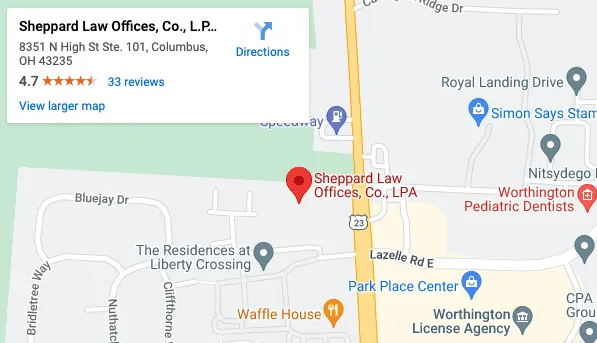
Resolve Divorce Tax Issues in Ohio
Divorce is a complex and emotionally draining process that involves various legal, financial, and personal considerations. Amidst the challenges, it is crucial to understand the divorce tax issues in Columbus, OH. The financial decisions made during this time can have significant consequences on both parties’ tax liabilities, making it essential to navigate divorce tax issues with care and expertise.
Divorce tax issues encompass a wide range of topics, including filing status, exemptions, alimony and spousal support, property division, child support, and tax credits. Each of these aspects requires meticulous attention to detail since every decision made can have far-reaching effects on future tax obligations.
At Sheppard Law Offices, we understand the complexities and challenges you face when dealing with divorce tax issues. Our team of experienced attorneys and legal professionals is dedicated to providing comprehensive guidance and support throughout the divorce process, particularly when navigating the intricate landscape of tax implications.
Why are tax issues important in divorce?
Tax issues are of paramount importance in divorce due to their significant financial impact on both parties involved. During divorce proceedings, assets, liabilities, and income are divided, which can have tax consequences. Understanding and properly addressing these tax implications is vital to ensure a fair and equitable distribution of resources. Failing to consider tax matters can result in unforeseen tax liabilities, missed opportunities for tax benefits, or even legal complications.
Tax issues include filing status, exemptions, alimony and spousal support, property division, child support, and tax credits. By addressing these tax-related matters, you can make informed decisions, minimize tax liabilities, and maximize available tax benefits, ultimately securing your financial well-being post-divorce. When you’re ready, our trusted Ohio divorce attorney is here to help you navigate this complex landscape effectively.
SPOUSAL SUPPORT (ALIMONY)
Taxability of Assets Distributed Incident to Divorce
The taxability of assets distributed incident to a divorce can vary depending on several factors, including the nature of the assets and the specific circumstances of the divorce settlement.
Property transfers between spouses
Transfers of property between spouses that occur as part of a divorce settlement are generally tax-free. This means that neither spouse will recognize a gain or loss on the transfer of assets. However, it’s important to note that this tax-free treatment applies only if the transfer is directly related to the divorce and occurs within one year of the date the marriage ends.
Transfer of retirement accounts
Special rules apply when retirement accounts, such as 401(k) plans or Individual Retirement Accounts (IRAs), are divided between spouses. Generally, if the transfer is made in accordance with a qualified domestic relations order (QDRO), it can be done without incurring immediate taxes or penalties. The recipient spouse who receives the retirement funds will be responsible for future taxes when they withdraw them.
Sale of assets
Capital gains taxes may apply if assets like a house or investment property are sold as part of the divorce settlement. Generally, if the sale occurs during the divorce process and the couple meets certain ownership and use tests, each spouse may be able to exclude up to $250,000 (or $500,000 if filing jointly) of capital gains from the sale of their main home. However, if the assets are sold after the divorce is finalized, capital gains taxes typically apply based on the individual circumstances of each spouse.
Alimony and child support
Alimony payments, or spousal support, are generally taxable to the recipient and deductible by the payer. However, this changed with the enactment of the Tax Cuts and Jobs Act in 2017. For divorces finalized after December 31, 2018, alimony payments are no longer taxable to the recipient or deductible by the payer. Child support payments, on the other hand, are neither taxable nor deductible.
Tax Deductibility of Professional Fees
The tax deductibility of professional fees depends on the nature of the cost and the purpose for which it was incurred. Here are some general guidelines:
Business-related professional fees
If you incur professional costs directly related to your business activities, such as fees paid to accountants, attorneys, consultants, or tax professionals, those fees are generally deductible as ordinary and necessary business expenses. These expenses can be claimed on your business tax return, such as a Schedule C for sole proprietors or the appropriate business tax form for partnerships, corporations, or LLCs.
Investment-related professional fees
Costs for professional services related to managing your investments, such as fees paid to financial advisors, investment managers, or brokers, may be deductible as investment expenses. However, this deduction is subject to certain limitations and is classified as a miscellaneous itemized deduction. Under the Tax Cuts and Jobs Act, miscellaneous itemized deductions, including investment expenses, are no longer deductible for tax years 2018 through 2025 unless specifically allowed under the tax code (e.g., certain investment expenses for producing taxable income).
Tax-related professional fees
Fees paid to tax professionals for tax preparation, tax planning, or tax advice are generally deductible as miscellaneous itemized deductions. However, similar to investment-related fees, the deduction for tax-related professional fees is currently suspended for tax years 2018 through 2025.
Personal legal or professional fees
Professional fees incurred for personal purposes, such as fees paid for personal legal matters, personal financial planning, or personal tax issues, are generally not deductible. These expenses are considered personal and are not eligible for a tax deduction.
Why Do I Need a Divorce Attorney?
Our Columbus OH family law attorney handles all legal matters concerning family relationships, such as divorce, child custody, adoption, spousal support, and property division. If you are dealing with a divorce tax issue in Ohio, it’s best to speak with an attorney for the following reasons.
- Legal expertise and guidance – Family and divorce law is complicated. A knowledgeable divorce tax lawyer can provide legal expertise and guidance to help you navigate the legal system.
- Objective advice and advocacy – It’s all too common to lose objectivity during emotionally charged family law matters. A local family law attorney can stay level-headed to provide objective advice and advocate for your best interests.
- Legal paperwork and procedures – Both family law matters and tax concerns involve a significant amount of paperwork, including petitions, motions, agreements, and court filings. An attorney can assist you in preparing and filing these documents correctly, ensuring that all legal requirements are met.
- Mediation and settlement – In many family law cases, there is an opportunity for mediation or settlement negotiations before going to court. A skilled family law attorney in Columbus, OH can help facilitate these discussions and work towards reaching a fair and mutually agreeable resolution.
- Court representation – If your family law matter requires court proceedings, having an experienced divorce attorney can be invaluable. They will represent you in court, present your case effectively, and protect your rights and interests.
If you’re going through a divorce, dealing with divorce tax issues, or facing any other family-related legal matter, please contact us to schedule your free consultation about your family law case.
Call our Columbus OH Attorney for Divorce Tax Issues!
Understanding and addressing tax issues in divorce is of utmost importance for individuals navigating this complex process. Tax considerations have significant financial implications, affecting income, deductions, credits, and overall tax liabilities. Failing to account for tax consequences properly can result in unexpected tax burdens or missed opportunities for tax benefits.
When facing family law matters, it’s best to have the support and guidance of a skilled and experienced attorney. Sheppard Law Offices offers exceptional legal representation in the field of family law, and choosing their services can provide you with the best possible outcome for your case
Aside from helping you understand the divorce tax issues, we can also assist you in various legal matters from bankruptcy, estate planning and foreclosure. At Sheppard Law Offices, we strive to provide the best legal services to all of our clients.





